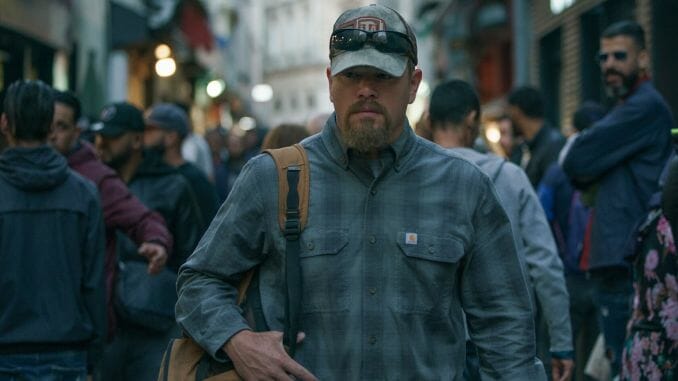Hokey Stillwater Drowns Its Performers In Schmaltz and Bad Decisions

It’s hard to know where to start with Stillwater. Grim, labored and ludicrous, writer/director Tom McCarthy’s first prestige effort since Spotlight is a mightily strange, stagnant beast: By turns a family drama, a based-on-a-true-story legal thriller, a romantic dramedy and an attempt to bend the hallmarks of Mediterranean noir toward political resonance. That the film is largely ineffectual in each of these modes is of course an issue, though ultimately one less ruinous than McCarthy’s grand-scale bungling of the tonal shifts required to pull off such a curious hybrid narrative.
Stillwater tells the story of Bill Baker (Matt Damon), an Oklahoma construction worker we first meet standing in the ruins of a house leveled by a tornado. Billy sifts dutifully through the wreckage, but as he travels back across this economically ravaged swath of the American South, there’s an omniscient sense of decay to the landscape, mainly distinguished by oil rigs, road signs and fast-food joints. Grunting and clenching his way through these opening scenes, whether he’s laboring on a work site or shoveling McDonald’s into his mouth like fuel, Damon at first takes a primarily physical approach to Bill, playing the character as the stereotypical embodiment of an all-American roughneck.
Clad in cheap flannels and jeans as well as off-brand Oakleys and a faded baseball cap (the look could collectively be dubbed “truck-stop chic”), Bill’s most noticeable accessories are his goatee and his bulging biceps, adorned with tattoos of a bald eagle—“That’s America,” he explains lamely—and a skull with a knife through it. Bill’s the kind of guy who bows his head to pray before every meal, then slathers on the ketchup and muscles that cap back into place. And while Damon occasionally emanates the mushy-hearted sensitivity he’s known for as a leading man, he mostly just settles on looking pained as he shuffles from scene to scene.
Though named for it, Stillwater spends only a few scenes in Bill’s home, soon skipping town to track him all the way to the French port city of Marseille. There, he submits to a series of security measures in order to visit his estranged daughter Allison (Abigail Breslin), who’s midway through a prison sentence for a murder she claims she didn’t commit. Five years into a nine-year sentence, Allison maintains her innocence in the death of her roommate and lover, a French Arab woman named Lina, while insisting that a man named Akim (Idir Azougli), the existence of whom investigators failed to establish, is actually responsible for Lina’s death.
It’s worth noting that the political grist of Stillwater’s legal-thriller narrative has been informed, and ghoulishly so, by the tragic case of Amanda Knox, a young American acquitted after spending almost four years in an Italian prison for the 2007 murder of her roommate, fellow exchange student Meredith Kercher. In an ill-advised effort to add further complexity to this fraught scenario, Allison’s romantic relationship with Lina, coupled with Allison’s whiteness and privilege, is said to have heightened a media frenzy around her trial. Bill and his daughter generally agree she was railroaded, though Stillwater later casts aspersions on her innocence in such a manner that makes the film’s echoing of a real criminal case feel all the more suspect.
While clumsily pursuing new shreds of evidence in Allison’s case, Bill strikes up a friendship with local stage actress and single mother Virginie (Camille Cottin, giving a more subtly nuanced performance than Stillwater knows what to do with), whose daughter Maya (Lilou Siauvaud) idolizes Bill. This soon paves the way for an unusual arrangement in which Bill takes up residence in their home, enlisting Virginie as an interpreter even as he puts some elbow grease into co-parenting Maya and fixing up the apartment. Soon, Bill and Virginie begin a romance, and Bill’s demeanor visibly brightens as he cautiously accepts what appears to be a second shot at a better life. Eventually, a chance encounter with Akim at a soccer match complicates this reset, leading Bill down a path of violence so jarringly incompatible with the film’s previous sense of docility that it feels spliced in from a separate movie; Damon appears equally flummoxed by this turn of events, retreating further into Bill at exactly the moment the film aims to deliver some sort of payoff for his character’s emotional arc.
Now, depending on the project, Damon’s quiet, amiable blankness as a leading man can feel alternately like a strength and a shortcoming. That’s why the Bourne trilogy—a rich set of films about the individual quest for self-knowledge, which open with his amnesiac assassin floating face-down in the Mediterranean, suspended as if in amniotic fluid—remains his finest hour, and why what we remember most about his savant janitor in Good Will Hunting is his youthful insecurity, that helpless flitting between red-hot emotions as Will grasps around for an identity of his own. The Talented Mr. Ripley, in which Damon played a chameleonic sociopath, proved the actor capable of exercising an iron grip over these kinds of characters, weaponizing that genial charm until the deeper vacancy behind it becomes hypnotically sinister.
-

-

-

-

-

-

-

-

-

-

-

-

-

-

-

-

-

-

-

-

-

-

-

-

-

-

-

-

-

-

-

-

-

-

-

-

-

-

-

-








































